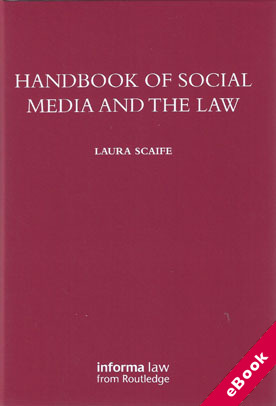
The device(s) you use to access the eBook content must be authorized with an Adobe ID before you download the product otherwise it will fail to register correctly.
For further information see https://www.wildy.com/ebook-formats
Once the order is confirmed an automated e-mail will be sent to you to allow you to download the eBook.
All eBooks are supplied firm sale and cannot be returned. If you believe there is a fault with your eBook then contact us on ebooks@wildy.com and we will help in resolving the issue. This does not affect your statutory rights.
The Social Media Handbook explains how the existing laws of defamation and communications based offences apply to social media communications and explores the tactical considerations both claimants and defendants must be aware of when dealing with cases involving social media.
Social media covers a number of different platforms that enable a user to interact and share information such as comments, photographs, videos and audio, publically or privately with other users online. The most well-known include LinkedIn, Twitter, YouTube, Wikipedia and Facebook. While there are existing works covering the law of defamation and communications based offences, this is the first book to cover the specific issues highlighted by social media.
This practical guide offers practitioners’ innovative ways to handle claims using the existing law and working within the rules of the platform providers themselves. The author also explores the risks which social media may present in a manner which allows in house counsel and communications professionals determine what procedures, policies, specifications and standards must be adopted in organisations’ internal governance and explains how to build regulatory frameworks to achieve compliance.
This book will be of great use to legal practitioners specialising in communications or internet law, in house counsel, communications professionals, journalists, students of communications law and anyone who uses social media in their work.